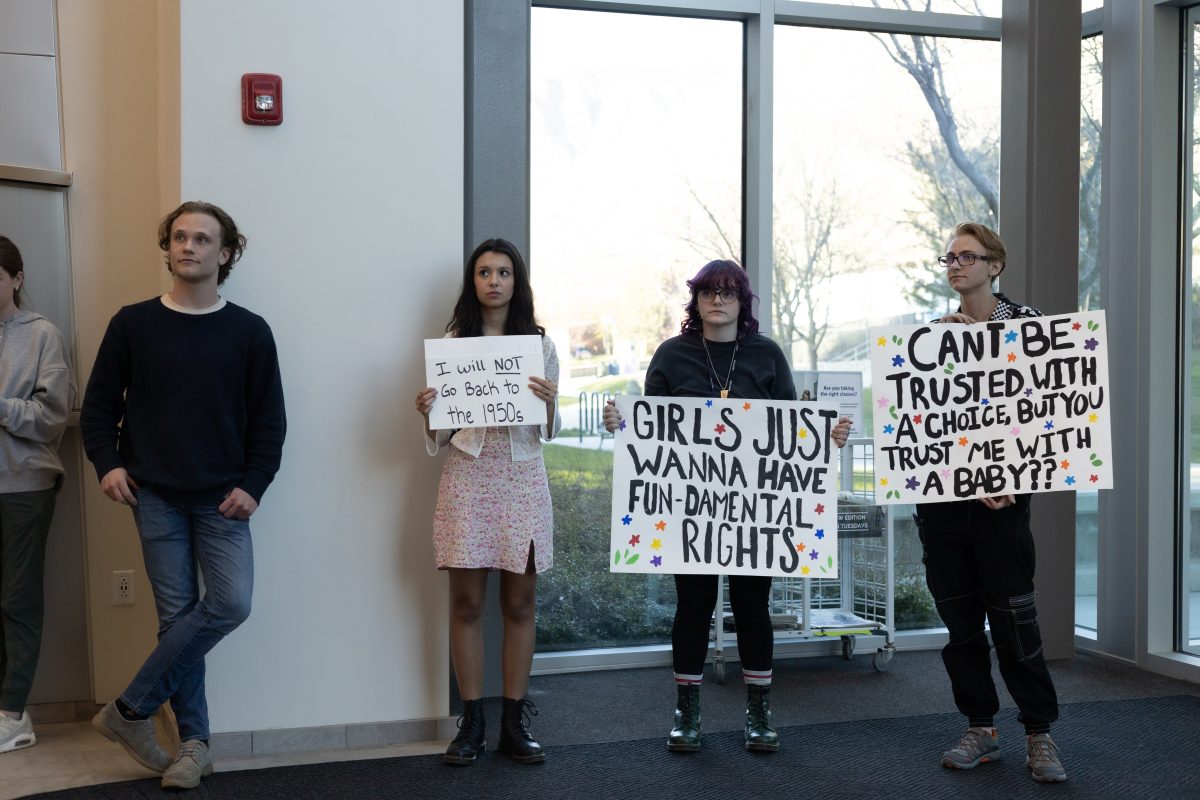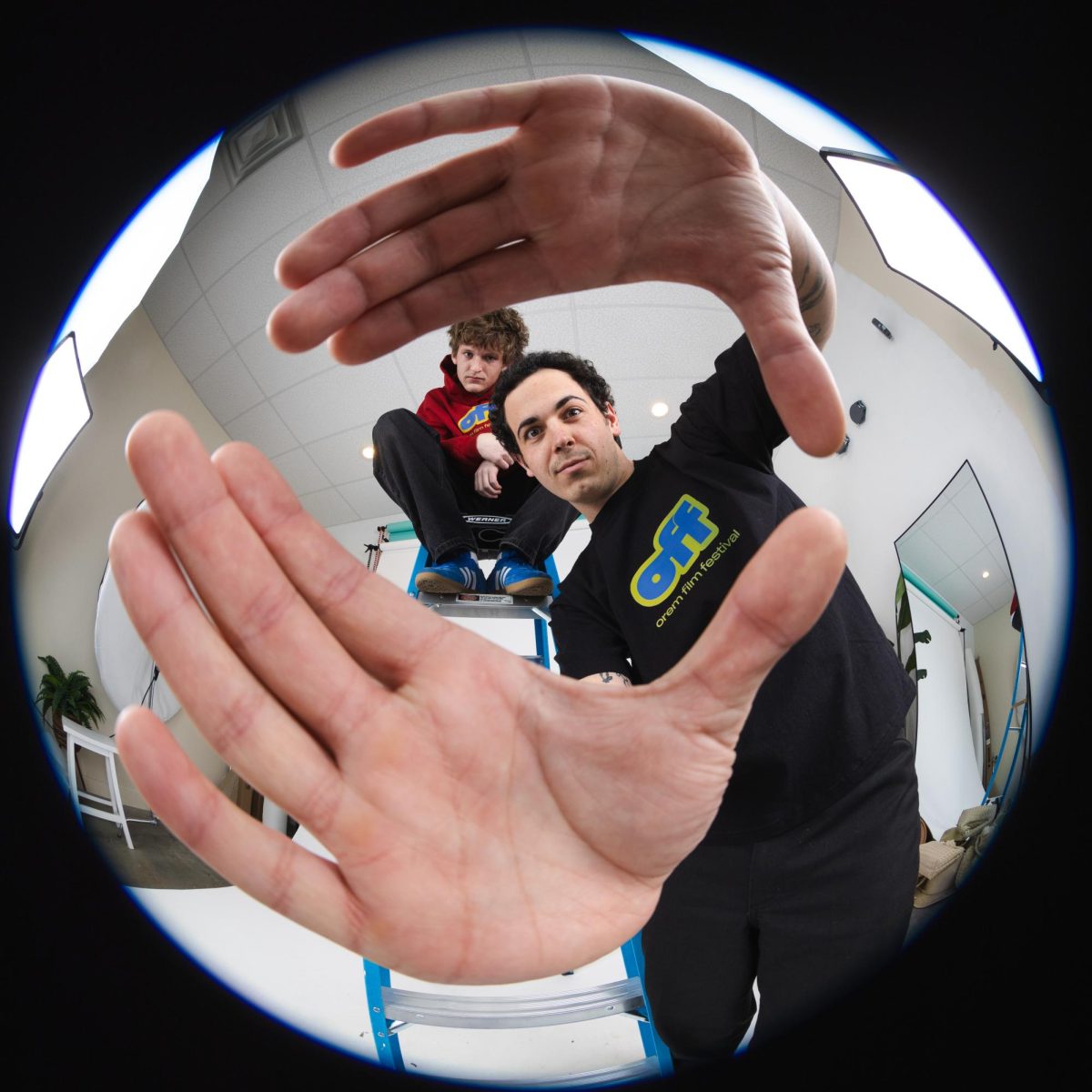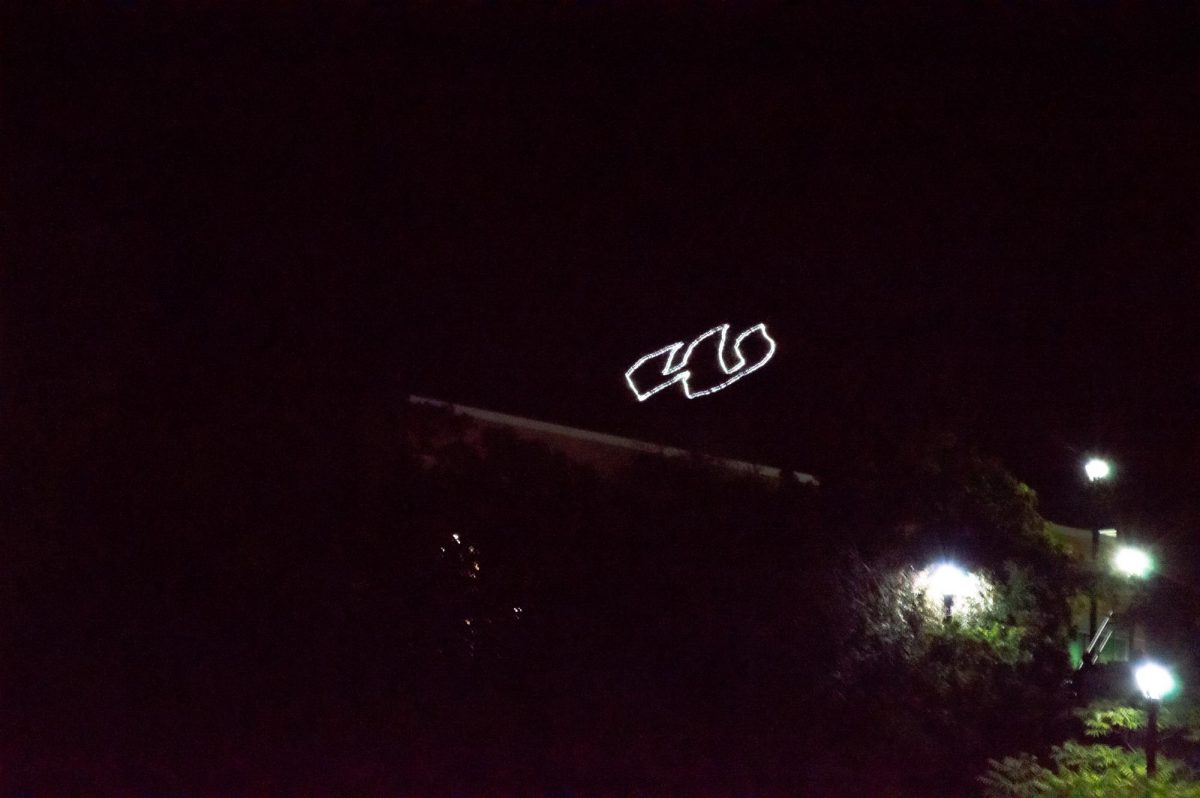From protests to conversations, Weber State University students decided to exercise their first amendment rights on campus in the spring semester of 2024.
On Jan. 17 a well-known transgender TikTok and social media personality, Dylan Mulvaney, visited Weber State’s Ogden campus for a Q&A with students as part of the WSUSA Speaker Series.
This was the first event where many Weber students were introduced to a relatively new club called the Young America’s Foundation. The organization became an official student-run club at the university in October 2023.
YAF is part of a leading national organization for young conservatives, according to their website.
Jared Caldwell, a WSU student and the chairman of Weber’s YAF chapter said that most members of their organization are activists.
At the Jan. 17 event, some YAF members protested by walking around with signs and starting conversations about transgenderism outside of the room where Mulvaney was speaking.
One of those signs read, “$40,000 of your tuition for nonsense!” The $40,000 dollars referred to how much it supposedly cost to book Mulvaney at a college in the 2023 and 2024 school year, according to a screenshot posted on the YAF instagram.
According to Tara Peris, the director of student involvement and leadership, it cost $31,500 to have Mulvaney speak at WSU. Peris said this amount came from student fees and was used to pay for Mulvaney’s travel and transportation needs.
Another sign that was hung on the front of YAF’s table in the Shepherd Union said, “Transgenderism is B.S. Change my mind.” This sign sprung a series of worries in the LGBTQ+ community on campus.
During an interview with The Signpost at the YAF table, a student asked Caldwell why he wrote the words, “Transgenderism is B.S. Change my mind,” on the sign.
“Essentially, part of it’s because I’m limited on space as well. I can’t put ‘transgenderism is a load of rubbish,’ ‘it’s complete nonsense’ or anything. It’s hard enough to do the sign. That’s going to make it a lot harder,” Caldwell said in response to the question. “So I decided to do B.S. because I thought, that’ll maybe get some people to want to come talk to me and really see, okay, why do you think this is B.S. or whatever.”
Caldwell also stated in the interview that he wanted to take a stance on his beliefs in regards to people who are transgender.
Axel Brown, a WSU freshman who is an openly bisexual man, said that he felt like YAF’s signs and protests targeted the LGBTQ+ community on campus.
Brown also inquired about the wording YAF members used on their Jan. 19 Instagram post o regarding the event where Mulvaney spoke.
“This past Wednesday on our campus was when the famous trans activist, TikToker Dylan Mulvaney came to our campus to spread the moronic, Trans agenda and we came prepared to spread the word to stand against it, and spread truth,” The Instagram post said. “I had some great conversations and my members did too. Plus we made these people realize that they’ll get push back for spreading their twisted agenda. God bless you all who participated with us the other day.”
Caldwell stated that WSU students who are executives for the club all have access to and run the Instagram account.
“I think it’s absolutely atrocious, and I think it’s ridiculous, especially in today’s age, where a lot of trans people’s identities have been attacked,” Brown said. “Especially with laws and everything lately, for this group to be able to do this, it’s mind-blowing to me that the school won’t do anything about it.”
Brown said that he emailed the dean of WSU about his concerns regarding the chapter and the dean sent him to the Office of Equal Opportunity.
According to an email provided by Brown, the Office of Equal Opportunity told him, “The university has reviewed these signs, along with the information provided thus far, and it has been determined that the line between freedom of speech and harassment, discrimination or other prohibited speech has not been crossed at this time.”
The Office of Equal Opportunity said in that email more information could be found on the university’s freedom of speech website.
Bryan Magaña, WSU’s public relations director, said that there have been several incidents in the 2023-24 school year that have caused people to reflect on freedom of speech.
Magaña also stated that Weber State is a public university and organizations both on and off campus can secure a space in the Shepherd Union building.
“Last year, Weber State launched the Campus Climate Team to help address things that affect our campus community, whether positively or negatively,” Magaña said. “In the months since, the CCT found freedom of speech to be a recurring theme.”
Brown is not the only one who has concerns about the club and what they talk about in both the Shepherd Union and on their Instagram page.
WSU students Katelyn Ouzts and Sylvia Martinez also reported the club to the Office of Equal Opportunity Martinez showed The Signpost her email from the OEO regarding her report made to the office.
Ouzts said the two reported YAF because they felt the club was spreading hate speech about the LGBTQ+ community on campus. Ouzts sent The Signpost a screenshot of the Instagram post created on Jan. 19, which shows the poster Caldwell created that said, “Transgenderism is B.S. Change my mind.” Ouzts felt that YAF’s poster at the Mulvaney event table was cruel and harmful to the community.
Ouzts stated that WSU answered back with the same response that Brown got, saying that YAF was not violating any policies and that the club was entitled to their freedom of speech.
During the interview with Caldwell, The Signpost asked him how he felt about people not feeling safe with the club on campus and how the club was reported because of these feelings.
“I think people need to just grow up, honestly. You see me here. Everybody sees me here. I’m not confrontational. I’m not angry. I don’t yell or anything because that doesn’t solve anything. Plus, it makes me look bad,” Caldwell said in response to the question.
Caldwell claims he has been yelled at before when he was recruiting for the chapter, but most of the time he said people are calm while having a conversation with him.
“I’m trying to approach as many different students as possible. I’m not trying to just approach all the students who look more conservative or right wing or whatever. Even people who are ardent leftists, I’ve talked to some of them, too,” Caldwell said.
Becky Stromberg, the student engagement coordinator with the Walker Institute of Politics & Public Service, is the advisor for the YAF club and stated the club abides by the university’s freedom of speech policy.
“We expect all students to treat everyone with respect and have civil conversations with all
students that they come in contact with,” Stromberg said.
On April 11 at 6 p.m., students came together to protest at an event held by YAF in Lindquist Hall. The event addressed abortion and pro-life activist Anna Strasburg was the guest speaker.
Protestors said the point of the silent protest was to promote inclusivity on campus by showing that students have a voice, even in situations where they feel like they don’t. Around 40 people protested the event by showing up with pro-choice and LGBTQ+ equality signs.
Brown said the students who planned the protest wanted it to be silent to show Strasburg respect while she gave her speech.
Although some students protested in support of women’s rights, the LGBTQ+ community or even against YAF, many students protested in demand of respect.
“People have said that they’ve felt uncomfortable because of [YAF]. That’s not OK.” Ouzts said.
WSU freshman and event protestor Tess Johnson’s opinion coincides with Ouzts’.
“Everyone has a right to their own views as long as those are expressed respectfully. But what they’re doing is not respectful, and that’s where I have an issue,” Johnson said. “I’m glad that I was able to be a part of this to share my voice in a respectful way to show how it should be done.”
After Strasburg gave her official speech for the event, she thanked the protestors for coming and proceeded to engage in a nearly hour long conversation with them.
WSU students are not alone in their worries about YAF. Students at the University of Utah have also shown representation of their first amendment rights regarding an event in November 2023 at the college.
Protests were made in regards to the U of U’s YAF chapter when the club showed the movie “Damaged” during an event they were holding.
According to the YAF’s press release, the protestors “shouted down the event,” and members of the YAF group were asked by police to leave. The press release did not say why the police asked those YAF members to leave the event.
Afterwards, the chapter got Mountain States Legal Foundation involved and the U of U disbanded the organization of student protesters, saying that they were heckling the screening of “Damaged.”
According to that press release, some students were referred to prosecution because they interfered with the screening.
The YAF chapter at the U of U did have a re-screening of “Damaged” that same month, with American activist Chloe Cole as a host.
Students at WSU are most concerned about YAF creating an environment on campus filled with hate speech. These students feel that this kind of hate speech should not be allowed on campus.
According to Amanda Nordstrom, who is a program officer in the Foundation for Individual Rights and Expression campus rights advocacy department, hate speech is a protected form of speech in the first amendment.
The Foundation for Individual Rights and Expression is an organization built to help answer questions from students, faculty, alumni, administrators, reporters, supporters and free speech advocates.
The Foundation for Individual Rights and Expression mission statement says the organization helps to “defend and sustain the individual rights of all Americans to free speech and free thought—the most essential qualities of liberty.”
According to Nordstrom, hate speech can’t be legally defined because what is offensive to one person, might not be offensive to another.
“So the First Amendment protects speech on campus unless it falls into a narrow category of unprotected speech,” Nordstrom said. “And there’s only three categories that fall into that, or only three categories for that.”
Nordstrom said the first category lies within the lines of speaker incitement to imminent lawless action.
The second category aligns with true threats, which is the kind of speech that threatens bodily harm. Nordstrom said that this kind of threat is when someone might do something to a person, like attack them.
That last category falls along the lines of speech that causes an immediate breach of the peace. Nordstrom said this might include fighting words.
When it comes to social media, first amendment rights are just as present as they are in person.
“Students do have the right to express themselves online and use their free speech rights to make posts that might be offensive or make posts that might bother someone else,” Nordstrom said. “But then other students are also just as free to make those posts back.”
Nordstrom said it can be hard for some people to understand and even come to terms with the first amendment because of how the law protects hate speech.
Magaña talked about how the Shepherd Union is a place where various organizations have events, tables and displays present. This area is a place where the first amendment is commonly utilized and seen by students and staff.
“Like any large community, Weber State is home to people from various backgrounds, in all stages of life, who hold an array of beliefs,” Magaña said. “As such, free speech continues to be a prevailing topic on campus, and it’s important for the university to reiterate the responsibilities and complexities that come along with it.”
The Signpost reporter and copyeditor Gracie Stephenson contributed to this story.










NormalAmerican • Apr 22, 2024 at 5:40 pm
“I reported something i think is a huge problem but they told me its not and backed it with factual information as to why. Theyre crazy im a victim” type sources.